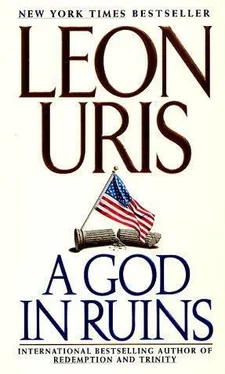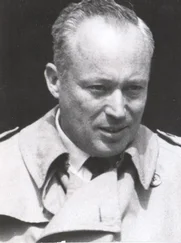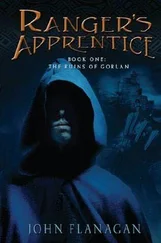Pucky was ashen. He had too much truth in his words, but damned if she would stand by quietly watching during a cultural collapse.
Now Darnell Jefferson jumped in. “Wait! Wait!” he cried. “I’m getting a vision. Pawtucket has just opened a ten-plex movie house. I go to the movies. What picture? Eight of them are buddy-uddy cop bang-bang films that must gross twenty million on the first weekend or die. Ah, at last a picture I want to see, badly. Passenger plane, a 747, off course, transatlantic flight. Somehow a half dozen terrorists get aboard with breakdown plastic guns. There is a case of deadly virus stored in the luggage compartment. If, oh God, the canister is found and opened by the vile terrorists .. . good-bye East Coast of America. The president of the United States is informed in his bad left ear while dozing in a reception line. Call a scramble to sitcomm.comm.comm.org, orders the president over the head of his chief of staff, Field Marshal Stoopnagel. Scramble the fighter planes of the famous Asshole Squadron. Shoot the motherfucker down if it gets closer than fifty miles off the coast. A sweet, innocent little girl in row twenty-two brushes the hair of her Barbie doll. Tm going to see my daddy in Sing Sing.””
Pucky and Thornton caught their breath and waited for Darnell to quit
ranting. He didn’t. “Wait a minute, is this the movie where the
poison was going to destroy the East Coast, or where it was carrying a
load of kudzu seeds to strangle every tree in the South? Well, we know
one thing, don’t we? Only one man can save the situation, Sylvester
Ford Harrison, who has played in sixty films without smiling. He is lowered into the 747 toilet by a jet helicopter. You know, brother and sister, I left the ten-plex rather disappointed, so when I got home I turned on the TV to get a breath of quality. They had an uptown audience of fourteen- and sixteen-year-olds and on the stage in front of the camera a lot of fat people. Jenny Degenerate, the hostess, asked Hydrangea Flapjacks if she’d had incest with her brothers and father. The audience squealed! Yes, ma’am, till I married my uncle.””
“All right, enough, Darnell. We have been patient. What are you trying to say?” Thornton demanded.
Darnell leaned over the table, and tears welled and perspiration dripped. “Thornton! For God’s sake! These pissy-ass movies and that pissy-ass television eat up more material in one day than was written by all the English authors during the entire Victorian era. Pucky is only trying to hold back an avalanche of ignorance.”
“All right,” Thornton said softly. “I want you to listen to something, and you tell me.”
He put a disk into the Bulldog’s CD-ROM and punched the required keys. In a few seconds music came over the speakers. It was sweet, melodic, dancy and teasy. It was pure Mozart.
Thornton changed the setting to what was obviously Beethoven. Pucky was caught up in trying to identify the symphony. It occurred to her that somehow, some unplayed and unpublished Mozart and Beethoven had been discovered. My God, it was world-shattering. “That’s the future of music,” Thornton said. “It is already the future of writing, as you have just documented so well, Darnell. The Bulldog was programmed to log fifty hours of each composer, then compose something new using the composer’s structure.”
“The computer composed that!” Darnell cried.
“That’s the future. Want to see some non-paintings by Rembrandt or
some non-statues by Michelangelo or maybe read a little non-Hemingway? Alas, the Bulldog is a little weak on Hemingway.”
Pucky looked around the office until she spotted the Ming vase she had bought at auction, snatched it from its stand, marched to his desk, lifted it over her head, and flung it into the monitor of the Bulldog.
MARINE CORPS AIR BASE, EL TORO,
CALIFORNIA—LATE 1970s
Throughout the history of the republic, military mavericks have popped up, some with innovations that changed the nature of war. After World War I, an Army Air Force general, Billy Mitchell, demonstrated the impossible, that airplanes could sink a battleship.
The Navy’s most renowned off-horse appeared in the form of Admiral Hyman Rickover, father of the nuclear submarine, who gave nightmares to his superiors and Congress.
Marine Major General Jeremiah Duncan was a lesser maverick, but a maverick nonetheless. By the time of the Great Depression the American military had fallen into a pathetic state. There was congressional pressure to disband the Marine Corps or reduce it to giving concerts on the Capitol steps and serving as embassy guards.
It was incumbent upon a group of Marine officers, including Duncan, to reinvent the mission of the Corps and thereby save it from extinction.
Their thesis was simple but unique. In future wars, global in nature, tactics had to be developed to land men from the sea against fortified land positions.
The major test in World War I had taken place against the Turkish peninsula at Gallipoli. British naval gunfire bashed the Turkish forts and emplacements for weeks prior to a landing by Anzac, British, and French forces. The Allied troops were cut to pieces, and ultimately the campaign ended in a disaster that resulted in Winston Churchill’s removal from the Admiralty.
Away from probing eyes on the island of Vieques, off the east coast of Puerto Rico, the Marines went about developing the tactics that would become a key to victory in future wars. Naval gunfire was moved in close and concentrated on a single beach or two, forcing the enemy to retreat inland temporarily. The Marines would then land infantry, set up a perimeter, and dig in to ward off the inevitable enemy counterattack. The key was holding a piece of turf, then moving inland.
All that was needed was a war to prove the thesis. It came along in good time.
It has been said that Jeremiah Duncan’s first words as an infant were “Semper Fidelis.” He became the first fighter pilot ace when he shot down five Japanese Zeros in a single day over Guadalcanal, but was shot down in turn and somehow escaped alive. An ace, but he could fly combat no more.
As a battalion commander in Korea, when he was advised that his men were surrounded, he said, “Good, that makes the tactical situation simpler.” Duncan led his mangled forces back from the Chosin Reservoir on the Chinese border to the sea in the dead of an icy winter.
In Vietnam he was moved from field command to staff to develop and improve new tactics against a tenacious and resourceful enemy.
Jeremiah Duncan’s chest bore a Congressional Medal of Honor, a Navy Cross, and three Purple Hearts. Known with affection throughout the Corps as Dogbreath, he now longed to retire to the Eastern Shore, where he had a big old house, a dandy fishing boat, and scads of children and grandchildren.
His wife of thirty years upped and died tragically in a house fire, leaving him devastated and debilitated. The Corps hung on to him to get him through his bereavement.
Jeremiah never got to the Eastern Shore. He ended up with a vague title as adviser to planning at El Toro Marine Air Base. There on the outskirts of Los Angeles, he worked another innovation, the lightning strike force.
The Corps, along with Bell and Boeing, was developing a hybrid aircraft—the SCARAB, that could take off and land like a helicopter, then fly like a turbo-prop. It was designed to carry twenty-some Marines with medical, electronic, and specialty personnel.
As was his wont, Jeremiah was soon bucking heads with the top brass. As a lady colonel inched into his life, he finally requested his belated retirement.
It was no surprise when the commandant, General Keith Brickhouse, a gnarly specimen not unlike Duncan, showed up at El Toro. With a name like Brickhouse, the general had a reputation akin to Dogbreath’s.
Читать дальше












